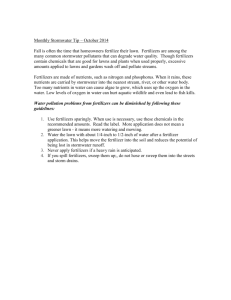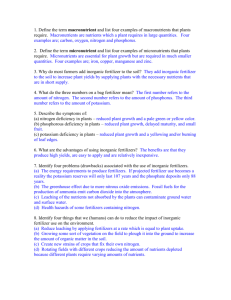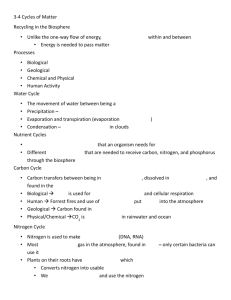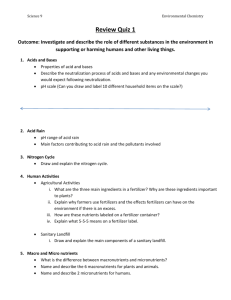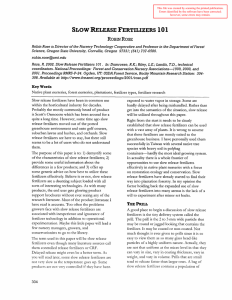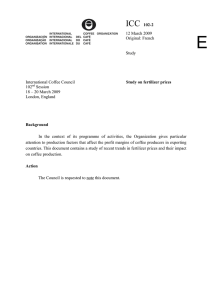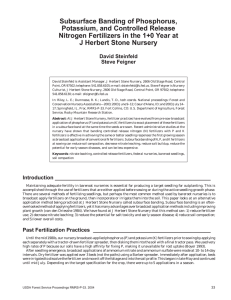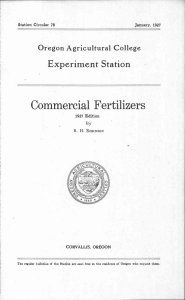Sheldon_Radovanovich_Biotehcnology_project
advertisement
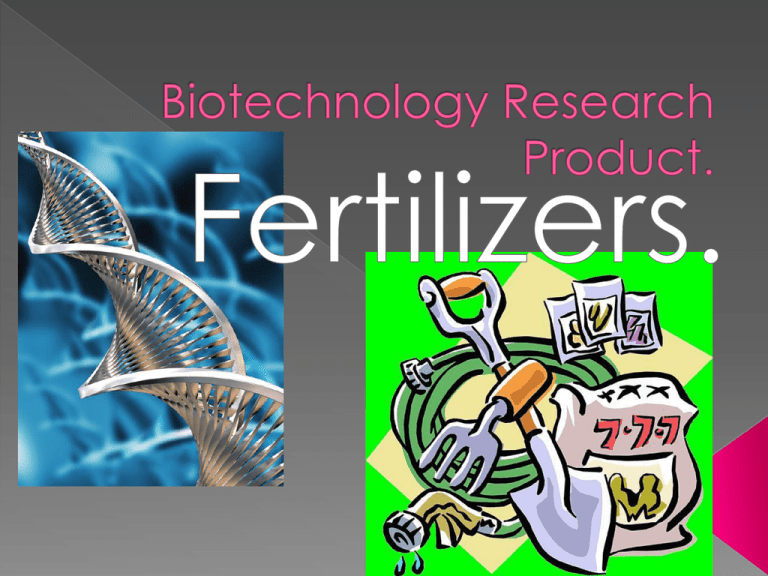
Benefits Balanced fertilization has positive effects on the environment. Fertilizer use allows farmers to continuously achieve high yields on the same land for many years, meaning that farmers don't need to clear new land. Fertilizers also help in preserving land for wildlife. Information found at: Costs Chemical fertilizers sterilize the natural minerals and nutrients found in soils. When it rains the fertilizer runs into our drains contaminating our water and killing fish. http://www.agroservicesinternational.com/Environment/Benefits.html http://wiki.answers.com/Q/The_effects_of_inorganic_fertilizers_on_the_ environment The three major nutrients for making organic fertilizers are: nitrogen, phosphorus and potassium (Lime is also used) Select a place to leave your leftovers ( You can also make a strong bin out of wood, if you do, you must leave the lid open to allow oxygen to fertilise it.) Two items needed to make organic fertilizers are green remains and brown leaves and other leftovers. A part of the green should have be mixed with two parts brown and this mixing will go on until it becomes damp. First put a layer of leaves, that are 4 inches thick and then put garden soil over the top again and again, then add two inches of green or brown leaves. Mix well, with manure or a garden fork. You can also add kitchen green leftover and also eggshells to it. Mix the pile up and down every week. Within two months your natural fertilizer will be ready Information found at: http://www.iloveindia.com/garden/garden-care/natural-fertilizers.html Advantages The advantages of fertilizers are perfect green lawns. Fertilizers promote green color, and lawn growth. Fertilizers improve the overall health of the lawn, which also kill weeds, keeps pests away, and improves curb appeal. Grass and flowers need nutrients, sunlight and water to carry out photosynthesis. Fertilizers help preserve nutrients. Disadvantages Chemical Fertilizers put acid into the soil, not letting any plants near it photosynthesise. Strengthens pesticides. Can burn the roots of flowers and plants Chemical fertilizer also get a lot of water out of the soil which it contaminates water It releases a green house gas (nitrous oxide) Information found at: http://www.the-lawn-advisor.com/Advantages-of-Fertilizers.html http://wiki.answers.com/Q/The_advantages_and_disadvantages_of_che mical_fertilizers Recycling of carbon and nitrogen Decaying recycles raw materials and gets rid of waste at the same time. Decay is the breaking down of organic matter by decomposer micro-organisms. Bacteria and fungi feed on the organic materials make energy. During this process both carbon and nitrogen are recycled. The carbon from waste products is made into carbon dioxide which plants need for photosynthesis. Nitrogen from proteins in dead or waste products is changed to nitrates in the soil which plants use to make new proteins. Information found at: http://www.bbc.co.uk/scotland/education/bitesize/standard/biology/biotechn ology/problems_and_profit_with_waste_rev4.shtml Glucose + Oxygen = Carbon Dioxide + Water + Energy http://www.bbc.co.uk/scotland/education/bitesiz e/standard/biology/biotechnology/problems_and _profit_with_waste_rev4.shtml http://www.the-lawn-advisor.com/Advantages-ofFertilizers.html http://wiki.answers.com/Q/The_advantages_and_ disadvantages_of_chemical_fertilizers http://www.iloveindia.com/garden/gardencare/natural-fertilizers.html http://www.agroservicesinternational.com/En vironment/Benefits.html http://wiki.answers.com/Q/The_effects_of_inor ganic_fertilizers_on_the_environment
